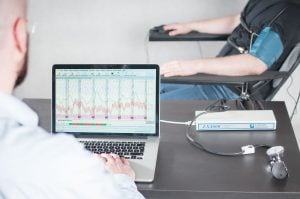The polygraph is possibly one of the most intriguing yet misunderstood devices in the scope of investigatory methodology. The scientific elements of the polygraph examination are relatively easy to understand. But it’s not a question of just purchasing the equipment and asking someone questions. Part of the reason inconclusive lie detector results occur is because examiners are not qualified, accredited or experienced.
The Science
The definition of the word ‘polygraph’ is “many writings” and relates to the scientific process. Physiological reactions are monitored simultaneously and will signal deception if it is present. Qualified polygraph examiners are forensic psycho-physiologists and the extent of their training will define how well the test is performed and results interpreted.
Whilst some view the polygraph with skepticism, it is usually because they haven’t fully understood how it works. In many countries a lie detector test is a pre-requisite for the pre-employment screening process of police officers, intelligence personnel, security staff and government employees.
It is essential that polygraph examiners are trained in the scientific and psychological aspects of the test. For this reason, the APA (American Polygraph Association) insists on the highest possible standards when certifying examiners.
The work of polygraph examiners includes:
- Preparing subjects for tests
- Formulating questions
- Conducting polygraph examinations
- Analysing data and writing reports
- Working closely with investigators
- Providing testimony when required
In order to maintain their accreditation examiners must participate in ongoing training throughout their careers.
Inconclusive lie detector results
There are many reasons why results may be deemed inconclusive. Occasionally an examiner will not be provided with all the facts. This means that the formulation of questions may be based on a false premise. For this reason, it is imperative that examiners are given comprehensive information about the matter including all the facts.
Qualified, highly trained polygraph examiners know how to create and pose questions. And also which questions should be posed to get to the truth. Obscure questions, delivered by untrained examiners are often the reason for inconclusive lie detector results.
For example, a professional examiner would not ask “Did you cause your girlfriend to go missing?” The reason for this is because if you sent your girlfriend to the shop and she didn’t return, you might believe it was your fault for sending her. The question should be “Do you know where you girlfriend is now”?
It is important to understand, a test that comes up as “inconclusive” doesn’t mean that a subject is lying or telling the truth. Usually when inconclusive lie detector results arise a second test will produce a conclusive opinion.
Tests can also produce inconclusive results if the polygraph examination is not carried out in a controlled environment. Distracting noises or interruptions whilst the test is in progress can affect the outcome. People involved in making the allegations that led to the test being in the same room, when the test is carried out, will also impact negatively.
Taking drugs or drinking alcohol the day/night before can also produce inconclusive results. The reality is that a qualified examiner has the ability to know whether drugs or alcohol have been taken and wouldn’t perform the test under those circumstances – much less in an unsuitable environment.
Optimum lie detector test results
The more information the examiner has the less likely inconclusive results will occur. Polygraph examiners are keepers of secrets and sensitive information and operate in a wholly confidential way.
They will insist on the perfect environment to conduct tests because whether it is to prove innocence, or establish guilt they want the optimum results possible.
Helping your polygraph examiner helps you to achieve the best outcome for all concerned.
At Lie Detector Test UK all our examiners are APA accredited, highly trained and experienced.


